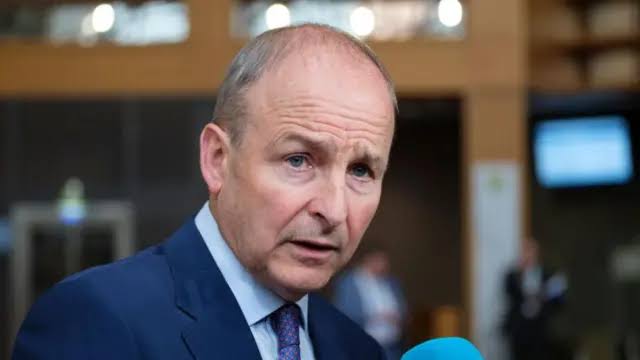Irish Prime Minister Micheál Martin is navigating a diplomatic balancing act during discussions with Donald Trump on Wednesday, as Ireland is among the nations most susceptible to the U.S. president’s economic strategies.
Typically, the yearly White House meeting to celebrate St. Patrick’s Day is relatively uncomplicated for the 5.4 million residents of Ireland, marked since the 1950s by the presentation of a shamrock bowl to the president in the Oval Office.
Past meetings were held with Trump’s proudly Irish-American predecessor, Joe Biden. This year’s engagement with Trump brings increased unpredictability, given that numerous Irish jobs, tax income, and exports are directly reliant on a group of U.S. multinational corporations.
“I am acutely aware that, in a very challenging global environment, the economic relationship between the United States and Ireland supports thousands and thousands of jobs,” Martin remarked at the beginning of his six-day trip to commemorate the March 17 holiday honoring Ireland’s patron saint.
For many years, U.S. companies have been operating in Ireland, largely drawn by its low corporate tax rate. The foreign multinational workforce, primarily U.S.-owned, amounts to 302,000, or 11% of the total workforce, and they significantly contribute to a corporate tax revenue that has resulted in substantial budget surpluses for Ireland.
A primary concern for Ireland is whether Trump will concentrate on the U.S. goods trade deficit with Ireland, which is driven by medicines and pharmaceutical ingredients produced in the EU member nation by U.S. firms that are then exported back to the U.S.
The world’s ten largest pharmaceutical companies, such as Johnson & Johnson, Pfizer, and Merck, have extensive facilities in Ireland.
According to Ireland’s Central Statistics Office, the deficit reached a record 50 billion euros ($54.2 billion) last year. By another metric, the U.S. Bureau of Economic Analysis estimated it to be $87 billion, higher than Canada and Germany, and only trailing behind Vietnam, Mexico, and China.
See More: Olympics-IOC presidential candidate Samaranch wants gender rule by early 2026
The U.S. enjoys a substantial surplus in services trade with Ireland, similar to its situation with the EU as a whole.
Trump has suggested imposing a 25% tariff on pharmaceutical imports and goods from the EU, both of which would affect Ireland significantly. He also made a campaign promise to reduce the U.S. corporate tax rate to match Ireland’s top rate of 15%, which would have even more detrimental effects.
Martin will be the first EU leader to meet at the Oval Office since Trump’s contentious meeting with Ukrainian President Volodymyr Zelenskiy. Given that Ireland was one of three European nations that officially acknowledged a Palestinian state last year, Martin may have to manage his discussions carefully when addressing issues related to the Middle East.




